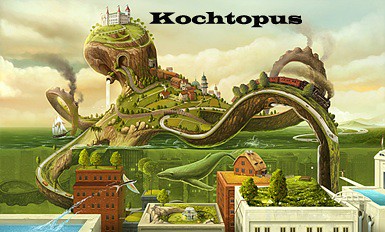"People's rights were violated... they never got their due process."
Charles Koch sees nothing wrong with the government confiscating private property, as long as he stands to make a profit.

9/1/10
By Yasha Levine
The New York Observer
Copyright 2010
Although highly diversified, Koch Industries' vast network of oil and gas pipelines remains the company's core business and main source of revenue.
The exact size of their pipeline network is not known, but some estimate that Koch Industries operates anywhere between 35,000 and 50,000 miles of pipelines between Texas and Canada—enough plumbing to wrap around the globe twice or zigzag between New York and Los Angeles 15 times.
How did the Kochs manage to build up a pipeline network of this magnitude? By getting the government to use its tyrannical powers of eminent domain forcibly seize private property on Koch Industries' behalf.
As far as libertarians are concerned, eminent domain is a socialist tyranny straight out of the Leninist playbook, as it recognizes the government as the real owner of all land and vests it with the power to expropriate private property for alleged public good.
At the most fundamental level, libertarians believe that eminent domain invalidates the notion of private property rights, threatening not just prosperity, but freedom. Charles Koch is clear on this. "Countries that clearly define and protect individual private property rights stimulate investment and grow," he writes in his book The Science of Success. "Those that threaten and confiscate private property lose capital and decline."
But not all property rights are created equal. Koch Industries oil pipeline recently built in Minnesota shows that Charles Koch does not see an is anything wrong with the government confiscating private property, as long as he stands to make a profit.
Completed in 2008, the 304-mile line now carries crude oil from the Canadian border to a Koch Industries refinery near the Twin Cities area via a two-foot-wide pipe. Company PR execs pitched the pipeline as a public benefit project, as it would increase Minnesota's gasoline supply.
But the 1,000-plus landowners who were forced to handover their private property so that Koch Industries could run its pipeline didn't quite see it that way. "People's rights were violated, and they never got their due process," a farmer whose fields were going to be cut in two by the pipeline told a newspaper in 2007. "It's wrong. People's property is one of the most important things to their livelihood."
To search TTC News Archives click
To view the Trans-Texas Corridor Blog click








<< Home